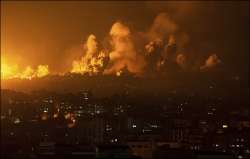Israel orders 'complete siege' on Gaza, cutting off access to electricity and food as war continues
Amid continued fighting between Israeli forces and Hamas, over 1,200 people have been killed in both sides. Israeli PM Benjamin Netanyahu had earlier threatened to cut off electricity to Gaza when he declared war.

Israeli Defence Minister Yoav Gallant has ordered a 'complete siege' on Gaza, saying that authorities will cut off access to electricity, food and fuel to the area as it escalated its response to an unprecedented attack by Hamas militants.
Notably, Israel and Egypt had imposed different levels of blockade on the violence-torn Gaza Strip after Hamas seized power from rival Palestinian forces in 2007. Gallant said that Israel is at war with "human animals" - a term used by both sides during conflict situations.
As the conflict between Israel and Hamas enters its third day, the government declared war and intensified its bombardment of the Gaza Strip in retaliation for a major surprise attack by Hamas. Militants of the armed group infiltrated Israel on Saturday and gunned down several civilians and soldiers during a Jewish holiday and launched a barrage of rockets.
In retaliation, Israel conducted airstrikes and struck over 1,000 targets in Gaza to prevent more infiltrations. The death count in the conflict crossed 1,200, including 700 killed by Hamas in Israel and 500 killed in Israel's retaliatory strikes on Gaza.
The leader of the Palestinian Islamic Jihad, which participated in Saturday's attack, said it was holding more than 30 Israelis among dozens of captives in Gaza. He said they would not be released until all Palestinian prisoners in Israeli jails are freed.
Israel Defence Forces (IDF) spokesperson Rear Admiral Daniel Hagari said that Israel has “control” of its border communities and that 15 out of 24 of those areas have been evacuated.
What is Israel doing now?
According to the Times of Israel, the IDF struck Hamas war rooms, a building housing Hamas operatives, several high-rise towers housing Hamas assets and other key areas crucial to the operations of the armed group.
Hagari said that fighting between military and Hamas fighters continued in and near Kfar Aza, Be’eri, Nirim, Shaar Hanegev, Nir Oz, Alumim and Holit. He also said that the Israeli military mobilised around 300,000 reservists with the goal of decimating Hamas' military and governing capabilities. The Israeli military estimated that 1,000 Hamas fighters took part in Saturday’s initial incursion.
Palestinian militants have also launched around 4,400 rockets at Israel, according to the military. They also broke through Israeli barriers with explosives and gunning down civilians and snatching people in towns, along highways and at a techno music festival attended by thousands in the desert. Around 260 people who attended the festival were killed.
According to the United Nations, Israeli airstrikes had destroyed 159 housing units across the Gaza Strip and severely damaged 1,210 others. Prime Minister Benjamin Netanyahu pledged to destroy “the military and governing capabilities” of the militant group, which is deeply rooted in Gaza.
The unprecedented attack raised questions on the capabilities of Israel's intelligence agencies Shin Bet and Mossad as to how Hamas were able to display such a surprising show of strength in one of the deadliest attacks on the Jewish country.
Defence Secretary Lloyd Austin ordered the Ford carrier strike group to sail to the Eastern Mediterranean to be ready to assist Israel. The deployment — which also includes a host of ships and warplanes — underscores the concern that the United States has in trying to keep the conflict from growing. Preliminary reports indicated at least four US citizens were killed in the attacks, and seven more were missing, a US official said.
Egypt spoke with both sides about a potential cease-fire, but an Egyptian official said Israel was not open to a truce “at this stage.” A policeman in Egypt opened fire Sunday on Israeli tourists in the city of Alexandria, killing at least two Israelis and one Egyptian, authorities said.
In the latest onslaught of the Hamas militants, the Iron Dome found itself overpowered by the 3,000-something rockets that were fired from the Gaza Strip. The Times of Israel reported that the defence system experienced a "technical error" during one of the barrages, which resulted in the rockets not being intercepted before they landed in populated areas.
(with agency inputs)